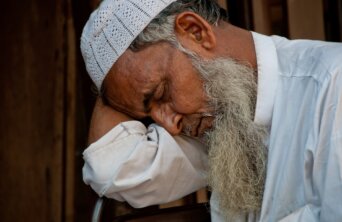- About
- Topics
- Picks
- Audio
- Story
- In-Depth
- Opinion
- News
- Donate
- Signup for our newsletterOur Editors' Best Picks.Send
Read, Debate: Engage.
| topic: | Islamophobia |
|---|---|
| located: | India |
| editor: | Hanan Zaffar |
Last week, in the north Indian state of Haryana, authorities carried out the demolition of hundreds of Muslim homes in the aftermath of communal violence between the Hindu majority and Muslim minority communities in the region. This incident, mirroring previous occurrences, once again saw Muslims bearing the brunt of the violence, with their lives and properties subjected to significant damage.
Muslim shrines, mosques and private and commercial properties were targeted as the situation turned tense in various parts of the state. Report surfaced of people being attacked for being spotted with beards. In one particular incident, the arson of a mosque resulted in the death of one person.
The recent surge in the targeting of Muslims is poised to further divide the electorate in anticipation of the upcoming general elections in less than a year. This religious polarisation in the country often works to the advantage of the ruling Hindu nationalist Bharatiya Janata Party (BJP).
The communal riots and subsequent targeting were followed by calls for economic and social boycotts of Muslims by right-wing Hindu groups. These groups openly urged people not to rent houses or shops to them, and discouraged any business dealings with the Muslim community.
Concurrently, various village parliaments, known as panchayats, in the region declared a "ban on the entry of Muslim traders in their areas." They stated that no Muslims would be permitted to engage in any form of commerce within their respective villages.
Instead of ensuring justice for the victims, the government chose to respond by demolishing hundreds of Muslim houses and shops. This trend of demolitions has been a recurring approach by the ruling party for some time now.
The demolitions of Muslim properties are done on the pretext of removing "illegal encroachments" and without any judicial sanction. Such demolitions are usually celebrated by far-right Hindus, and therefore prove to be politically and electorally advantageous for the ruling party. Many experts argue that these communal clashes are likely to persist until the elections, with the BJP using polarising tactics as part of its strategy.
In response to the escalating crisis, several community groups and NGOs have stepped up to provide assistance, particularly to those whose homes were demolished by the government in the aftermath of the communal unrest. Organisations like Miles2Smile are actively involved in providing relief and rehabilitation to individuals who lost their homes in the government's demolition drive.
The NGO has initiated fundraising efforts to support the victims of communal clashes and is offering temporary shelter and relief. However, given the scale of violence and state persecution, there is an urgent need for additional initiatives of this nature to address the situation effectively.
Image by Reiner Knudsen.
